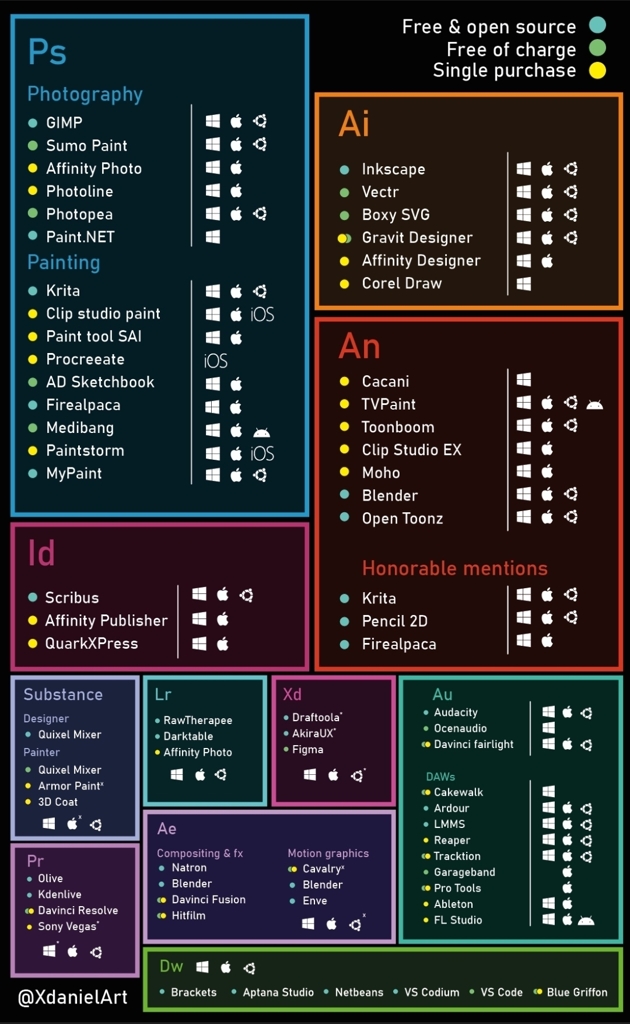For context, I want to run a small personal gig (offering stuff on Patreon). Nothing too fancy.
In order to do that, I would need to use the Adobe suite, Windows, some audio and video effects, all requiring a commercial license.
In theory, I start to make money. How would Microsoft and Adobe know that I don’t pay for their software?
If I use some audio effects, how would their owners even be able to tell / find my work? We’re talking about basic sound effect, like rain, door knocks etc.
I’ve always been confused by this
Chances of getting caught are next to nothing.
If you do get caught, you’re fucked. Like fucked. The legal headaches and costs going up against Adobe or MS will ruin you… forever.
With that said, pirating tools is one thing, but using other people’s loops or artistic work without approval is another matter altogether. And that kind of stuff will land you into all kinds of trouble, not to mention curb your work as talk will quickly get around in the community.
If you’re serious about becoming a musician or artist or a creative selling their work, reputation and community standing is like 90% of it.
And if you’re wondering how can an artist tell? We know our work. And people talk. Share stuff. Sooner or later, it’ll get around. The internet is still powered by people.
You would only likely get caught if you either do something stupid or someone tells Microsoft or Adobe with evidence, even then, the process to grass on them is a ballache, so if someone does actually take the time to do it, then you must have pissed them off so bad you might deserve it.
Why not use FOSS alternatives, or at least say you do?
If your stealing assets and IP, its just a matter of when you get caught, not if.
Name a single person who has been sued by Adobe for pirating their software.
John Ligma
Ah yes, the famous maker of sports equipment.
Ligma Balls?
Can’t do that off the top of my head, but this law firm probably could: https://adobeaudits.com/adobe-audit-faq/
deleted by creator
Most of those use cases are untraceable.
But there’s some things you shouldn’t pirate. I was a freelance developer for a company. They hired another set of freelancers who used stock photos and music, but didn’t have the proper licenses. Had legal papers sent their way.
I learned about it because the company started demanding I provide all the proper licensing of my code and the libs I used. I have no idea what the details are or what happened. But they were pretty freaked out.
This is most important comment, understanding threat vector is most important.
When evaluating if piracy is a problem, understand first who is likely to take action against you.
Using adobe suite and providing finished work to client that will use it. Very few threat vector since your client will never publish the psd(or whatever) file to the world and so adobe will never know.
Now if we change some assumptions and the work you do, your client publishes publicly, or sells to a third party that you do not know or can control. Now you are in uncertain territory. If its published publicly there is a small chance adobe may check meta data to verify licence. Or if its sold to third party, maybe third party uses it in a way that ends up revealing same meta data to adobe. Then adobe may give a shit. Chance probably still small but non-zero.
So understand your use case and who will have access to raw files and metadata. As long as that stays within areas you have control or have reasonable certainty. Adobe has no way to figure it out.
How about using open source alternatives? Like Gimp or Inkscape?
Not to be a dick, because I agree, but this doesn’t really answer the question.
>User posts a support query for paid software in a piracy sub.
>“Why not use FOSS instead?”
Every single time.
Not everyone has the time and resources to relearn a new piece of software when they already have their workflow sorted out. Nobody asked for FOSS alternatives, it’s a piracy sub.
Besides, shit like GIMP isn’t even half as good as photoshop.
Calm down dude.
Also, I wouldn’t mind people pirating Photoshop for personal purposes, but if you’re going to do this for your business and make a profit off their software, you ought to pay for it.
That’s my opinion.
deleted by creator
There are plenty of artists who use pirated software to create shit but haven’t got into trouble, the trick is to block the network requests and strip the Metadata.
And MS/Adobe would not go for a small patreon artist because they know that if they go too far, people will be pushed towards their competitors, which they don’t want since their business model hinges on being the most widely used software and thus not allowing any competition to grow.
.
There is a theoretical possibility, but you have to be practical. Its upto an individual to decide.
deleted by creator
deleted by creator
deleted by creator
And Krita.
Like David RevoyAlso Blender? I’m mean if they’re adding sound effects.
Sofie Jantak does 2D stuff in BlenderAlso don’t pirate rain and door knocks, just get them from people who freely share that sort of thing.
Like theseBBC also has a great sound library for sound effects.
Here is an alternative Piped link(s):
Sofie Jantak does 2D stuff in Blender
Piped is a privacy-respecting open-source alternative frontend to YouTube.
I’m open-source; check me out at GitHub.
the true path
We should pirate stuff only if no other good open source alternatives are available.
deleted by creator
I’d rather pay for stuff if the creators really deserve it. Like independent video game developers for example. Or I’ll donate to developers who give away their work as well.
If we pirate everything, don’t be surprised if smaller players disappear and only the big ones remain and take advantage of their position.
deleted by creator
How about answering the question that was asked:
How do companies know if I use cracked software or assets for my personal gig?
How about you check your attitude?
It was a simple suggestion made in good faith.
Sometimes, I search for information on how to resolve Windows-related issues because I often assist my relatives and friends with their computer problems. It can be quite exhausting when I come across online discussions on platforms like Reddit or StackOverflow, and instead of finding relevant answers, I encounter responses from individuals suggesting a switch to Linux or something like that. These responses are unrelated to the original question.
So consider your attitude before making simple suggestions “in good faith”. There’s nothing good in it. What you’re doing is not helpful and toxic, even if the toxicity is subtle.
Have you also considered though that this is how knowledge spreads. For every 100 people who read this they might say “here we go again with the FOSS…”, but a handful of people might say “GIMP? What?” and go check it out.
Open discussion instead of strictly direct question and answer is important.
I’ve made the switch to FOSS. When faced with tasks that would only require two clicks in Photoshop, I turn to online searches like “how to do X in GIMP.” However, the results are often in the form of either a 10-minute video or a 10-step article. I’m not engaged in professional work. While I partially agree with your point of view, I find it the suggestion to “consider GIMP and Inkscape” superficial in this context. I could accept it if the person I was responding to had shared useful links or information to aid in the transition: sets of useful plugins, free tutorials, and other resources aimed towards those, who are familiar with Photoshop. Any software is just a tool. The OP’s objective is to accomplish tasks, so it’s natural for them to stick with familiar tools instead of learning new instruments. Consider another thing: if they are professionals in the field, they must have practice and deep knowledge of tools like Photoshop, not GIMP.
Wow… Ok…
Take a chill pill.
I’m chill and polite. I’ve precisely explained what’s wrong with the answer, I wasn’t talking about you. So if you have no counterarguments, just stop arguing. There’s no need to act childish and to try to undermine the other person.
Can’t you just let go already?
I’d also encourage you to look into FOSS alternatives but I have a friend who’s a graphic designer and he’s been pirating the crap out of Adobe since he began his studies in the early 2000s. He says neither he nor any of his collagues (all freelancers) ever had a problem with pirated software. It’s literally unheard of. And if you think about it, how is Adobe gonna find out if you block their phoning home with a firewall? Printers don’t give a damn (and couldn’t tell), neither can clients or random people on the internet. No one is ever going to be “Nice work but can you quickly somehow proof to me that you actually have the ridiculously overpriced subscription for that barely functioning design suite eveyone uses because there’s no alternative (except for Affinity maybe)?”
deleted by creator
Username checks out.
If it’s not Adobe your pirating but a small firm consider buying their stuff if you can afford it. Yes, I know this is the piracy forum but just like with indie games I think if you have the money and get value out of it then it’s cool to support actually people, that need to eat. Global Evilcorps surely not, but people are supporting you via Patreon so why not give some of that money to the people who develop the tools that help you make that money …
The moment you start selling things, you transition from “a sternly worded letter” to a lawsuit with insane damages claims.
To break that down:
- Software: Generally speaking, MS/Adobe will probably just assume but won’t care if you are a small enough fry. And in a patreon context, you are probably fine as far as customers. But for “real” gig work, you might get asked to sign a document saying you are legit. At one of my old companies we would generally have contractors sign a legal document saying that they were legit so that we have a paper trail to blame it all on them.
- Assets: One, people can generally smell an asshole from a mile away. But if you must steal the work of others and sell it as your own, be aware that the same tools used for DMCA takedowns on youtube and twitch (computer vision to detect copyrighted images, audio analysis for songs, etc) work here too. And while I have no idea what handsome devil is doing it, there are tools to scrape the various crowdfunding sites since patreon and the like tend to be cool about taking stuff down. So good luck advertising that.
As for what you can do to minimize your risk and not be a piece of shit?
- Open source equivalents of software. If you want a “real job” you are going to need to learn and use adobe. But there is a lot of value in knowing a few different tools and getting started with an open source or cheaper workflow is a great idea. Check Humble Bundle for the latter since they tend to sell the B/C tier stuff for cheap every few months
- Royalty Free assets. Check the licensing terms but these are usually pay once assets that you can then use until the end of time and even resell. Hell, a lot are completely free.
And, because it was suggested below
- Use pirated software but pretend it is open source: Like it or not, the gap between something like gimp and photoshop is massive. There is a reason that adobe have a stranglehold on “art” related fields and that is because they put the work in. And a lot of their tools are VERY distinctive to people who understand those workflows. Which, combined with being the kind of asshole who steals the work of real artists to sell on your own, is a good recipe to “get called out” by someone tipping off their buddy at Adobe.
One, people can generally smell an asshole from a mile away.
Can confirm. I can smell assholes from far away too.
Adobe and Microsoft only kinda care about you. You’re one person. All the freelancers out there are still a fairly small part of their respective balance sheets. If you’re a freelance worker, some of your customers might require you to show valid licenses for the software you use, because they want to make sure their partners are ethical (at least, in this regard). Alternatively, you could use FOSS apps.
As someone else already said, if you are making money using commercial software, you really should be paying for it. The cost of your software should be factored into what you charge your customers. They should understand that.
id say its more ethical to pirate adobe software than pay for it
Now that everything’s a subscription I can’t really argue with that.
deleted by creator
Nobody’s in prison for being unethical (as much as I would like that, lol).
deleted by creator
most of the applications ‘phone home’, often constantly after installation. often, source files will include a serial number embedded in metadata in source projects, that can be traces to a license.
there are many methods, but if you protect yourself (air gapped equipment) and cleanse your output you should be ok. that said, there are new techniques out/on the horizon with embedded data that would not be removable.
If you are so concerned, why not use alternatives

I just read about Solidworks. Don’t pirate that, it still contacts home and gives them all the info it can pull from your pc: ip, your name, company info, etc. and then they send you a huge bill for the costs of 5 years or so of licensing. Also don’t have an illegal copy next to a legal one, because then the legal one will detect the illegal one and send the info. Or open projects created with pirated software with a legal version.
Of course this data snooping would be illegal in the EU, but outside that I would be careful.
That’s so much intelligent programming
Intelligent programming that makes the user’s experience worse
It’s still pretty cool though. Especially DRM like denuvo, it’s pretty amazing how the DRM can scramble stuff and unscramble it and how it has multiple redundant ways to detect if it’s working correctly or not.
It’s even crazier how some people can remove it.
Denuvo absolutely worsens the UX though. Not sure if the Autodesk thing would worsen it though. Doesn’t sound like it.
Idgaf about pirating huge corpos stuff. Thats always moral. But don’t steal SFX and the like, theres just too much of it for free.
deleted by creator
If you earn/get big enough to care about it, then you would in the first place. Most software piracy busting methods revolves around existence of a snitch who knows you’re pirating. You definitely can get away with it if you’re just pirating it yourself, but a corporation with like 100 workers cannot do it when all it takes is one person to get busted.
On sound effects / samples it depends on how many people see it, so you don’t need to worry too much unless you get popular similarly.
In general they wont. The way they usually find out with small businesses is disgruntled former employees snitching (some actually offer a reward for this).
I was once hired at a company to get them ISO compliant (8001, 27001 and various other certifications specific for data storage and handling for banks and healthcare).
First thing I did was run inventory on all hard and software and it was quickly clear they ran 50 something unlicensed Windows and Office copies, 3 unlicensed Windows Server copies, 2 unlicensed Exchange copies, a whole bunch of unlicensed Winzip copies and on and on and on.
The typical with small to mid sized businesses.
You absolutely need to get your licensing in order if you want to get those certifications, especially the banking and healthcare data ones.
I made them a list of everything we’d have to acquire to be in order with that part.
They refused. They refused to the point of telling me “it’s not working out and we’re letting you go”.
So, yeah, that’s how you get Microsoft to hear about a company running a couple hundred unlicensed products :)
They never got their ISO certs and downsized considerably a year or two later.
How do you even tell the difference between a licensed vs unlicensed windows install?
Because pirated versions will be running a VLK license while there is no VLK subscription on file or run a KMS software to fake the authentication of licenses.
Or in some cases, just run pure unlicensed and Windows will tell you on the desktop itself that the copy is unlicensed.
If inspected, you have to prove you have the correct licenses.
In some cases you’ll be allowed to just buy the licenses there and then, but if you’ve been running dozens of unlicensed copies or dozens of straight up illegal copies (with faked/cracked/stolen licenses), they’ll put the hammer down and you’ll be audited in detail to the point they’ll end up billing AND fining you for every piece of software you’ve used in your entire history.
They don’t. But if you get big and along the way in a throwaway comment on Patreon mentioned you use the Adobe Suite and other tools they’ll look into that and if you don’t pay they’ll send a very stern letter demanding payment.
Generally for Joe Schmo if they’re found out it stops at a letter demanding payment, and if you don’t pay it likely won’t escalate, especially if you deny the accusation. But for someone making a profit they’ll get their money and it’s a major headache and just not worth it considering you are making money far exceeding the rather small cost.
For assets, you would be distributing other people’s work without permission. Some companies scan online content for digital fingerprints of copyrighted material. Think Youtube content ID but they are other tools out there.
As for software you used without a license, the work you did doesn’t matter in that regard, you’re only liable for using unlicensed software by bypassing copyright protection methods. You’re not distributing it. Their DRM (even cracked) might send them enough identifiable information to sue you (in theory).



















